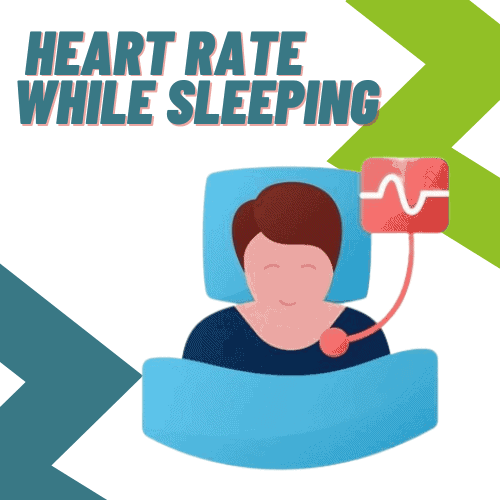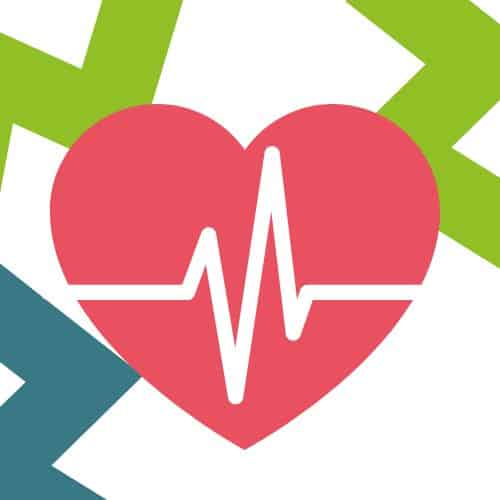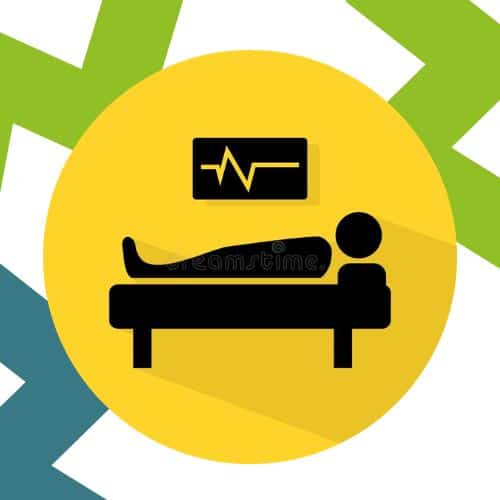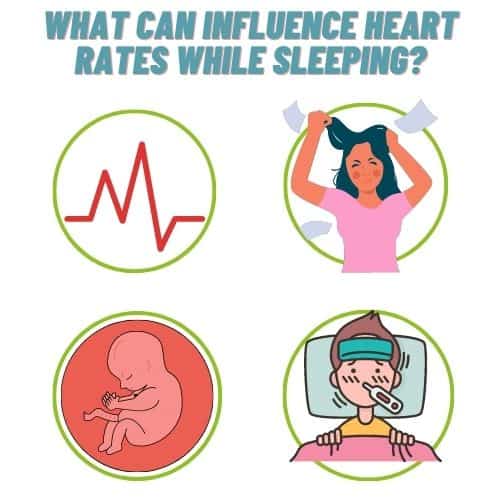Our heart rate changes throughout the day, depending on how active we are and how we feel. The heart rate can go up because of stress or exercise, but it can go down because of sleep. An average normal heart rate during sleep is usually between forty and fifty “beats per minute” (bpm), but this can vary from person to person.

Resting Heart Rate During the Night

Different people show different average RHRs at night. Normal heart rate is anywhere from 40 to 100 beats per minute (BPM). It can also change from day to day, depending on how well you are hydrated, how high you are, how active you are, and how warm your body is. While at night, it decreases.
Heart Rate Variations During Sleep?
During sleep, the pulse or heart rate is typically lower than while an individual is awake. Though, when a sleepy person goes through the distinct phases of sleep, the heart rate also varies. For example, in the early phases of light sleep, the heart rate starts to decrease.

The heart rate reaches its lowest levels during deep sleep. On the other hand, during “rapid eye movement” (REM) sleep, the pulse rate may increase to an analogous pace when a person is awake.
The majority of individuals experience a slower pulse rate during “non-rapid eye movement (NREM) sleep”, which protects them from cardiac events [1]. In contrast, REM sleep is frequently characterized by periods of increased activity.
Even though this is normal, researchers think that the increase in activity during “REM sleep” may help clarify why individuals who are already weak often have heart attacks and other bad things that happen in the morning when they spend more time in REM sleep than other stages of sleep.
It is important to mention here, sleep issues can have significant effects on your heart and cardiovascular health, contributing to a faster heart rate and increased blood pressure. Sleep disorders including periodic limb movements, sleep apnea, and shift work disorder have been associated with an increased risk of heart disease.
Can your resting heart rate change while sleeping?
Regular running or other moderate-to-vigorous physical activity can reduce your resting heart rate. Exercise strengthens the heart muscle, allowing it to pump more blood with each beat. As a result, more oxygen is given to the muscles, and the heart beats less frequently than it would in an individual.

Unless a person is taking medications that lower the heart rate, such as beta-blockers or calcium channel blockers, the resting heart rate remains relatively constant with age.
For several weeks, take your pulse when you wake up a few times per week to calculate your resting heart rate. With your index and middle fingers, lightly press the opposing wrist, right below the fat pad of the thumb, just below the knuckle.
Or
lightly press the side of your neck, just below the jawbone. Count the number of beats within thirty seconds. This value should be multiplied by two to determine your heart rate in beats per minute. Another method is to count your heartbeat for 15 seconds and multiply by four.
An abnormally low resting heart rate (less than 50 beats per minute) or a resting heart rate of 100 or more should prompt a call to the doctor.
What Can Influence Heart Rates While Sleeping?
Several factors can affect the heart rate while sleeping.

1. Elevated Resting Heart Rate
The average heart rate during sleep should be less than when awake with the possible exclusion of REM sleep, Experts describe that high heart or pulse rates are associated with a longer time required to fall asleep, worse sleep quality, and an elevated likelihood of developing cardiovascular disease.
2. Stress And Anxiety
Anxiety increases blood pressure and heart rate [2]. Anxiety and stress can cause an increase in heart rate during sleep [3]. In turn, poor sleep quality can severely affect blood pressure and heart rate throughout the day.
3. Poor Sleep Hygiene
Sleeping late at night, inadequate sleep, or sleeping for prolong periods, might also cause a faster heart rate during sleep. Research indicated that delaying bedtime by just thirty minutes can increase “resting heart rate” during sleep, with an impact lasting until the next day [4]. As well as nightmares, waking up in the “middle” of the night might boost your “resting heart rate” [5].
4. Pregnancy
During pregnancy, the demand on the maternal heart increases as it has to adjust the supply of the growing fetus with oxygen and nutrients. So as a result, pulse rate or heart rate can arise to adjust this demand of the growing fetus. Fortunately, regular exercise throughout pregnancy may aid reduce resting heart rate” and improve cardiovascular health [6].
5. Other factors
Having a fever might raise the heart rate. In addition, some specific drugs may raise the heart rate. Moreover, exercise and caffeine might cause an upsurge in pulse rate.
A rise in pulse rate is not usually an emergency situation. The heart beating rate can momentarily increase for a variety of legitimate reasons, including exercise and stress, and then return to normal on its own. Contact a medical expert if it remains elevated though. In certain instances, an elevated heart rate may indicate an underlying health condition.
6. Reduced Resting Heart Rate
As with athletes, lower heart rates may indicate a healthy heart, although this is not always the case. In elderly individuals, bradycardia is characterized by a resting heart rate of fewer than 60 beats per minute (bpm).
Several health issues, including rheumatic fever, Lyme disease, cardiac disease, and sleep apnea can lead to slower heart rhythms. Additionally, many chemicals and medications may cause a decrease in heart rate. Moreover, sleep apnea, Anorexia, hypothyroidism, and all occasionally lead to a decreased heart rate.
How Can You Measure Your Sleeping Heart Rate?
One of the effective ways to monitor your heart rate while sleeping is to use a smartwatch. A smartwatch gives you the current figure of your sleeping heart rate. Now different companies have offered small sensors to monitor your heart rate while sleeping. These devices are bed-integrated and give you an accurate reading of your pulse rate.
Additionally, it is important to mention here that If your medical practitioner thinks you might be having trouble sleeping, he or she may tell you to do a sleep study in a laboratory or to do an “at-home sleep study” using specialized equipment that gives a more precise reading of your pulse rate.
You can also manually calculate your heartbeat, during the day or any time you want by lightly touching the artery in your wrist, neck, or chest. This will tell you what your resting heart rate is. Count how many times your heart beats in the next 30 seconds, and then multiply that number by two.
References
1. Boudreau P, Yeh WH, Dumont GA, Boivin DB. Circadian variation of heart rate variability across sleep stages. Sleep. 2013 Dec 1;36(12):1919-28. DOI: 10.5665/sleep.3230. PMID: 24293767; PMCID: PMC3825442.
2. Dimitriev DA, Saperova EV, Dimitriev AD. State Anxiety and Nonlinear Dynamics of Heart Rate Variability in Students. PLoS One. 2016 Jan 25;11(1):e0146131. doi: 10.1371/journal.pone.0146131. PMID: 26807793; PMCID: PMC4726749.
3. Azza Y, Grueschow M, Karlen W, Seifritz E, Kleim B. How stress affects sleep and mental health: nocturnal heart rate increases during prolonged stress and interacts with childhood trauma exposure to predict anxiety. Sleep. 2020 Jun 15;43(6):zsz310. doi: 10.1093/sleep/zsz310. PMID: 31863098.
4. Mezick EJ, Matthews KA, Hall MH, Richard Jennings J, Kamarck TW. Sleep duration and cardiovascular responses to stress in undergraduate men. Psychophysiology. 2014 Jan;51(1):88-96. doi: 10.1111/psyp.12144. Epub 2013 Sep 9. PMID: 24016263; PMCID: PMC3883723.
5. Paul F, Alpers GW, Reinhard I, Schredl M. Nightmares do result in psychophysiological arousal: A multimeasure ambulatory assessment study. Psychophysiology. 2019 Jul;56(7):e13366. doi: 10.1111/psyp.13366. Epub 2019 Mar 30. PMID: 30927477.6. May LE, Knowlton J, Hanson J, Suminski R, Paynter C, Fang X, Gustafson KM. Effects of Exercise During Pregnancy on Maternal Heart Rate and Heart Rate Variability. PM R. 2016 Jul;8(7):611-7. doi: 10.1016/j.pmrj.2015.11.006. Epub 2015 Nov 18. PMID: 26603201.
Related Articles:
- How to Burn Fat While Sleeping
- How to Lose Weight While Sleeping
- How to Stop Snoring While Sleeping
- How to Relieve Hip Pain While Sleeping
- How to Prevent Dry Mouth While Sleeping
- What Causes Leg Cramps While Sleeping
- How to Decompress Spine While Sleeping
- How to Clear a Stuffy Nose While Sleeping
- How to Increase Oxygen Levels While Sleeping
- How to Relieve Lower Back Pain While Sleeping
- How Many Calories Do You Burn While Sleeping
- What Causes Headaches at Night While Sleeping
- What Causes Extremely Dry Mouth While Sleeping
- How to Improve Circulation in Legs While Sleeping
- How to Relieve Back Pain During Pregnancy While Sleeping
